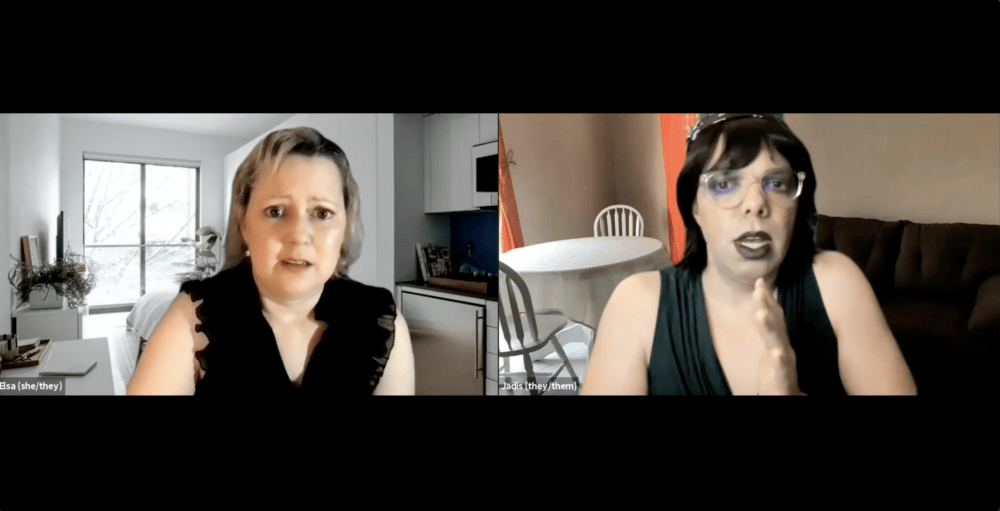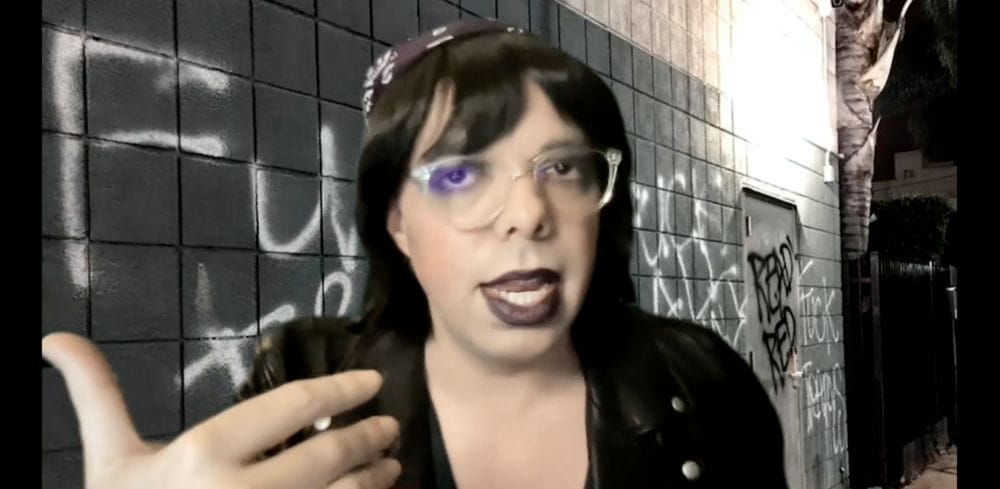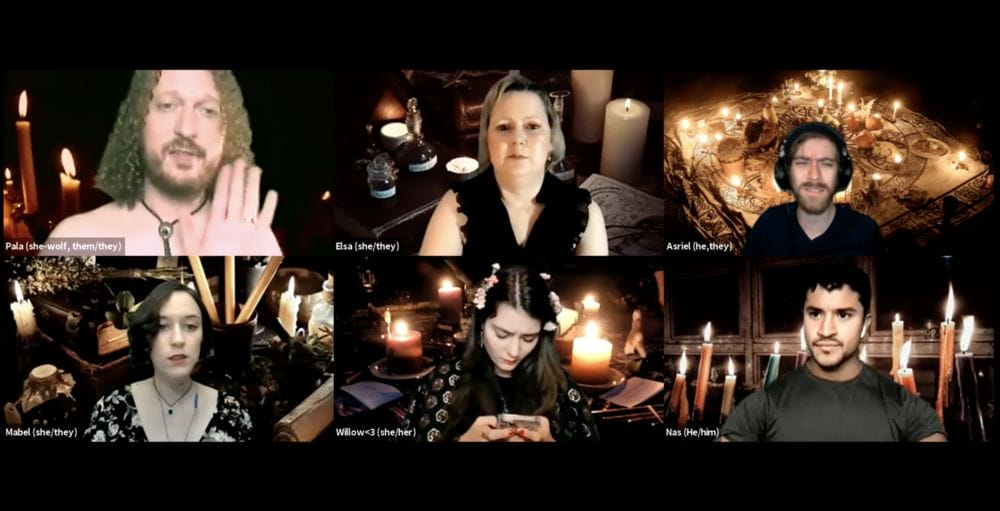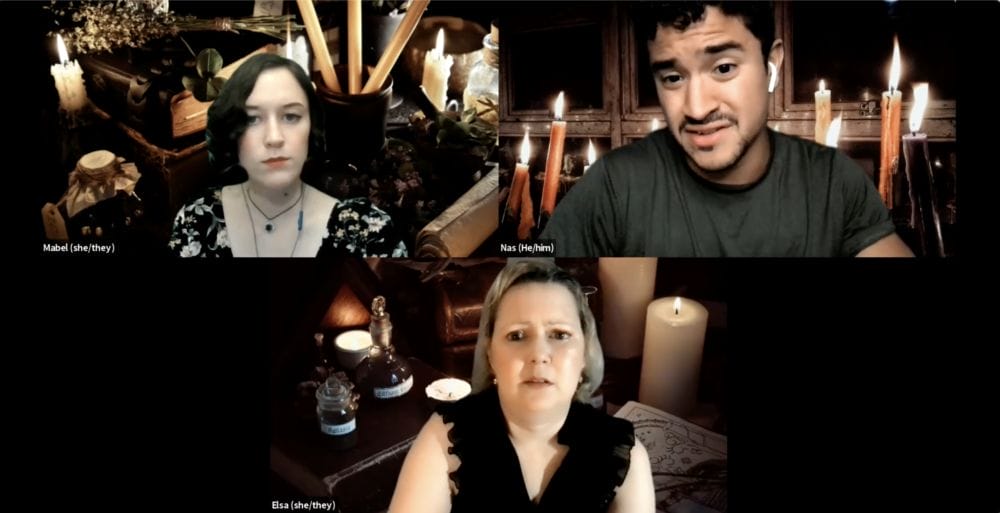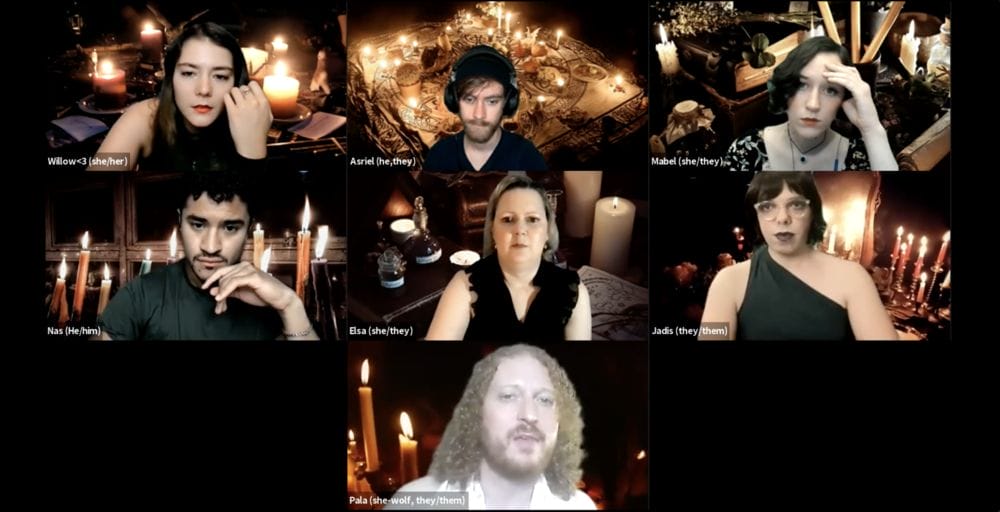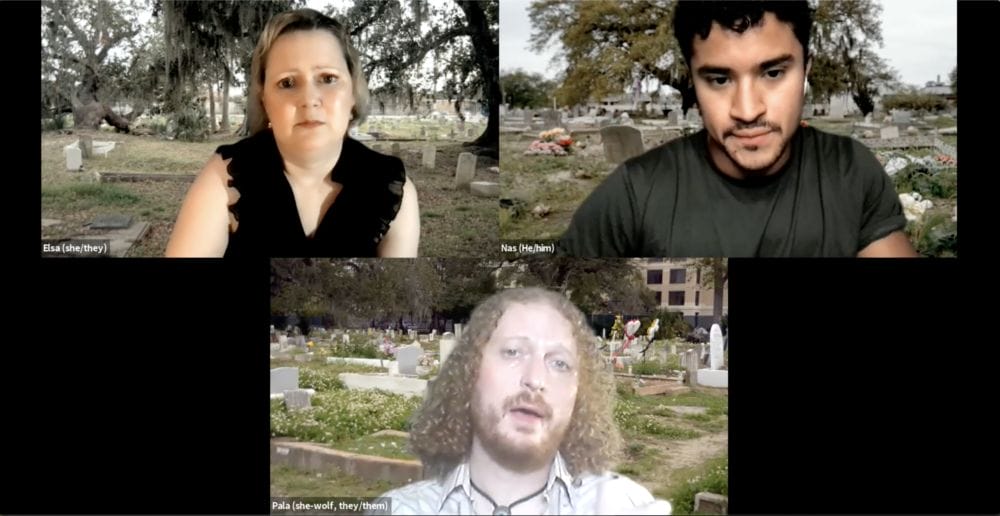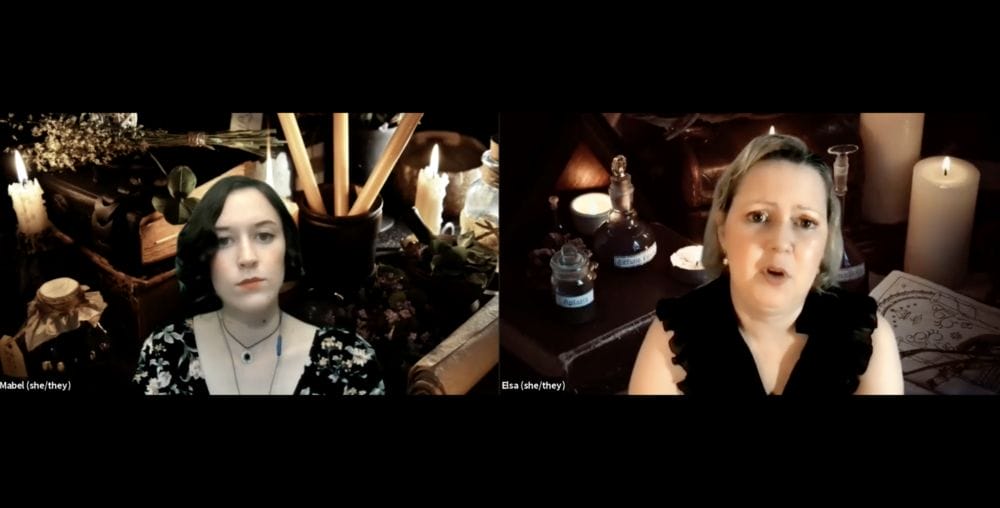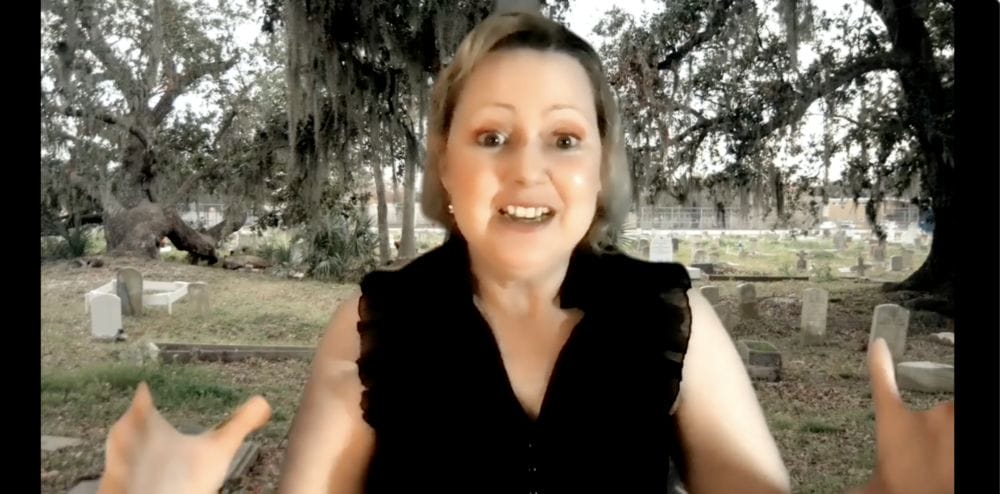Back in the winter of 2015, an online Facebook group for queer witches was torn apart by controversy, when one of the members tried to share their collection of human bones, which had been taken from a nearby grave. What followed were accusations of cultural appropriation, conversations regarding racism and inclusivity, and the reimagination of this so-called safe space.
Written by Brandon Walker and directed by Erin Cronican, the Artistic Directors of The Seeing Place Theater, The Queer Witch Conspiracy explores and re-envisions these real life-events as a means to explore identity, the creation of safe spaces, and the challenges that can arise in the process. Walker and Cronican set to expand the theatrical canon with what they hope is a truly intersectional and thought-provoking piece that exposes audiences to material that, in the playwright’s words, is “a little ahead of its time at the moment”.
Here, Picture This Post (PTP) talks to Brandon Walker (BW) and Erin Cronican (EC) about the process of working on The Queer Witch Conspiracy, the fight for inclusivity within theater, and the creation of safe spaces.
(PTP) The Queer Witch Conspiracy is based on real events. Could you tell our readers about this story and what first drew you to it?
(BW) I'm actually rather self-conscious about this aspect because the media really did a number on the community in question, and several people suffered a great deal of Internet abuse. In a nugget, a user in a queer witch Facebook group posted an offering to share bones that were rising to the surface from a nearby graveyard in New Orleans. Someone from the Facebook group shared the post to Tumblr, and it turned into an Internet controversy that tore apart the group, especially as the graveyard in question is historically for poor, Black and Brown communities.
I was introduced to the events in a cultural anthropology class that focused on gender, and I thought it would be a wonderful structure through which to discuss dysphoria, race, cultural appropriation, and safe spaces. Additionally, it features several LGBTQIA+ characters of differing personal identifications.
The Seeing Place Theater’s website mentions your goal to create theater that “reflects the struggles and triumphs of our world.” In what ways does this story reflect our society right now?
(BW) This story has an interesting challenge: the general public has internalized the idea that witches are bad, and many people can't see past that idea when they hear about the play. With that said, everyone that came to see the show made it a point to share that they came in with great trepidation and were pleasantly surprised to see how relevant the story is to the things we're dealing with. When it comes down to it, the witch community is full of queer people who are looking for a place to belong that is outside of the judgment of our White systemic patriarchy. The play reflects society in that all of the characters police one another to try and create a safe space for themselves. It is very reflective of any group that is trying to address inclusivity and to counteract issues related to intersectionality today.
How did the general public respond to this play?
(EC) We were blown away by the response. During our post-show discussion, one audience member (a self-described 77-year-old cis hetero white male) told us his views were forever changed by what we had exposed him to in the play and thanked us profusely. Many people, including our artists, were humbled to finally see stories of themselves be shared with a wider audience. Stories about gender non-conforming people are not that common in the current theatrical canon, and we’re proud to have provided an opportunity for these voices to be heard.
(BW) One of the things that is important to us is to be giving back to the community. Throughout the pandemic, we felt the urge to engage the philanthropic spirit of audiences so that our shows went beyond entertainment and actually made a tangible impact in the world. We have been pairing our productions with partner organizations whose messaging reflects some of the questions raised by the plays we're performing, and then we engage community leaders in panel discussions to dive deep into some of the struggles facing today's world. We’ve raised thousands of dollars for six social justice organizations, and improved access to our work tenfold – even during a pandemic. It's something that has been very fulfilling, and we definitely plan to continue this program as we look toward being onstage again in the future.
What were some challenges of working online during the COVID-19 pandemic to develop The Queer Witch Conspiracy?
(EC) Over the course of six productions (including The Queer Witch Conspiracy) from June 2020 to June 2021, we learned how to deal with these challenges. First, we work with our permanent ensemble, which has already developed a rapport and ease with one another. These are things that are difficult to build online, but for us we had already had many, many months in person to develop them. As artists, we also need to create a sense that the audience is live with us, and online we cannot see them. So, we relied upon our fellow artists’ responses to give us a sense of audience and impact.
Could you share with Picture This Post readers how you make this play interactive?
(EC) One of the most exciting facets of the play, as we presented it, was that it took place fully on Zoom. That was new and exciting, and made us feel like we were “live” more than anything we have ever done online. How did we achieve this? First, the dialogue of the play clearly portrayed Zoom gatherings (larger and smaller) which made us feel like we were all in the “here and now.” There was no need to pretend that we were in a bar, or a park, or an office space – we were fully present, along with our audience, on the same platform throughout the reality of the play.
Second, we kept the chat window open and encouraged our audience to communicate with us throughout the show. The cast also improvised in the chat during the large gatherings in the play, much like we would during any Zoom meeting. We also instructed our performers to interact with the audience’s chats, making them a part of the action.
Finally, toward the end of the play there is a climactic moment that culminates in a vote, and we used Zoom’s polling feature to allow the audience to vote on which way the story should go. Depending on the result of the vote, dialogue would flow in one direction or another. This directly impacted the experience of the audience because they had a say in what ended up happening.
Brandon, you worked on this project as both an actor and a playwright. What were the challenges in taking these two different roles?
(BW) As an actor, my largest challenge was coming to terms with the fact that though I am non-binary, as is the character and the person upon whom the play is based, I have a different history with what that means. In other words, I was assigned male at birth, and the real person was assigned female at birth. For the show, I leaned into a more feminine and gothic presentation than I do in everyday life. I think that anyone who self-identifies as a queer witch is much more open to being on the fringes of society than I am. With that said, there was a wonderful freedom in being able to be my full self in a role.
In the writing, I really tried to embrace the intricacies of our group. I did not set out to create a retelling of the true story, but instead base our collective story on actual events. Honestly, I couldn't even get that close to the actual story. I reached out to some of the individuals who had been involved, and they weren't interested in rehashing it. As such, I told the story that I imagined might have taken place, and I based it on my involvement with several groups struggling to be inclusive and to create a brave space. In the end, it was quite freeing that none of us were exact to the characters in question, and it allowed for the story to be ours.
Erin, how does your background as an actor and activist influence you as a director?
(EC) I think it makes me a great listener, which is an important part of being a director. I understand the inner workings of an actor, and I can hear through to their needs and wants, which I respond to with specific questioning, active listening, and appropriate action. I also bring a special kind of empathy to my work as a director. Finally, I’m an investigative actor, reveling in the research process of building a role, and I get to expand on that skillset and apply it to all roles and to the ensemble as a whole while directing.
For me, being a part of a social justice theater company lets me, as an activist, channel all of my feverish insistence for change into tangible art that acts like a megaphone. How do we do this with a play like The Queer Witch Conspiracy? This play presents a central social justice problem that the characters spend the play trying to work through. It doesn’t offer any perfect solutions, which allows the audience to take that work on for themselves. How have they been changed by the play? What questions about themselves and the world do they leave with? And how can they take action to make a difference? Leaving our audiences with these questions is how we spread activism and create social justice allies who are filled with empathy and an urge to act.
What kind of stories are you excited to work on next?
(BW) Eventually, I want to write a play that is inclusive of genderfluidity without being about it. I haven't figured out how to do that yet. The main issue that I think non-binary playwrights are grappling with at the moment is: how do we write a story that goes beyond coming out? When it comes down to it, our gender is only one part of who we are, and I want to find a way to write about humanity first. I'm still new to the journey of living my truth in public, and it has been easy to embrace it completely during the pandemic because I've been mostly at home. Reintegration into society is a process, and I'm still getting used to the idea of wearing what I want to in the world and having that be okay. With that said, I'm still very proud of the two plays I've written that are dealing with these issues. A lot of my thoughts right now surround the issue of genderfluid business attire, which almost seems like an oxymoron.
Is there anything else you would like to add that can give our readers a better insight into this project?
(BW) I did about three months’ worth of research into witchcraft among various different communities in order to feel like I had enough understanding to write the play. With that said, the play is not about witchcraft. It is about ancestry, culture, and spiritual centeredness. It's about finding a welcoming place to belong. I think it's maybe a little ahead of its time at the moment. The play was written for Zoom, but I am revising it for a live audience to be performed next year. I'm hopeful that the world we're stepping into will have a little more footing then. Most of our audiences commented that it spoke to them as being a very important piece. I hope we get to see that come to fruition.
(EC) Next up for this project will be to revise the play for a live audience in a whole new interactive (COVID-safe) way. We will be presenting an in-person reading of The Queer Witch Conspiracy in New York City in early October as a part of the NYC City Artists Corps Program. It is a single performance with limited, free tickets for those in the LGBTQIA+ community and their families. If you identify with this group and would like tickets, email us at outreach@seeingplacetheater.com for more information.
Nominate this for The Picture This Post BEST OF 2021???
Click Readers' Choice
Want to see who won the Picture This Post READERS’ CHOICE competition last year?
WATCH THIS SHORT VIDEO—
For more information on The Queer Witch Conspiracy, visit the The Seeing Place Theater’s website.
Photos courtesy of The Seeing Place Theater
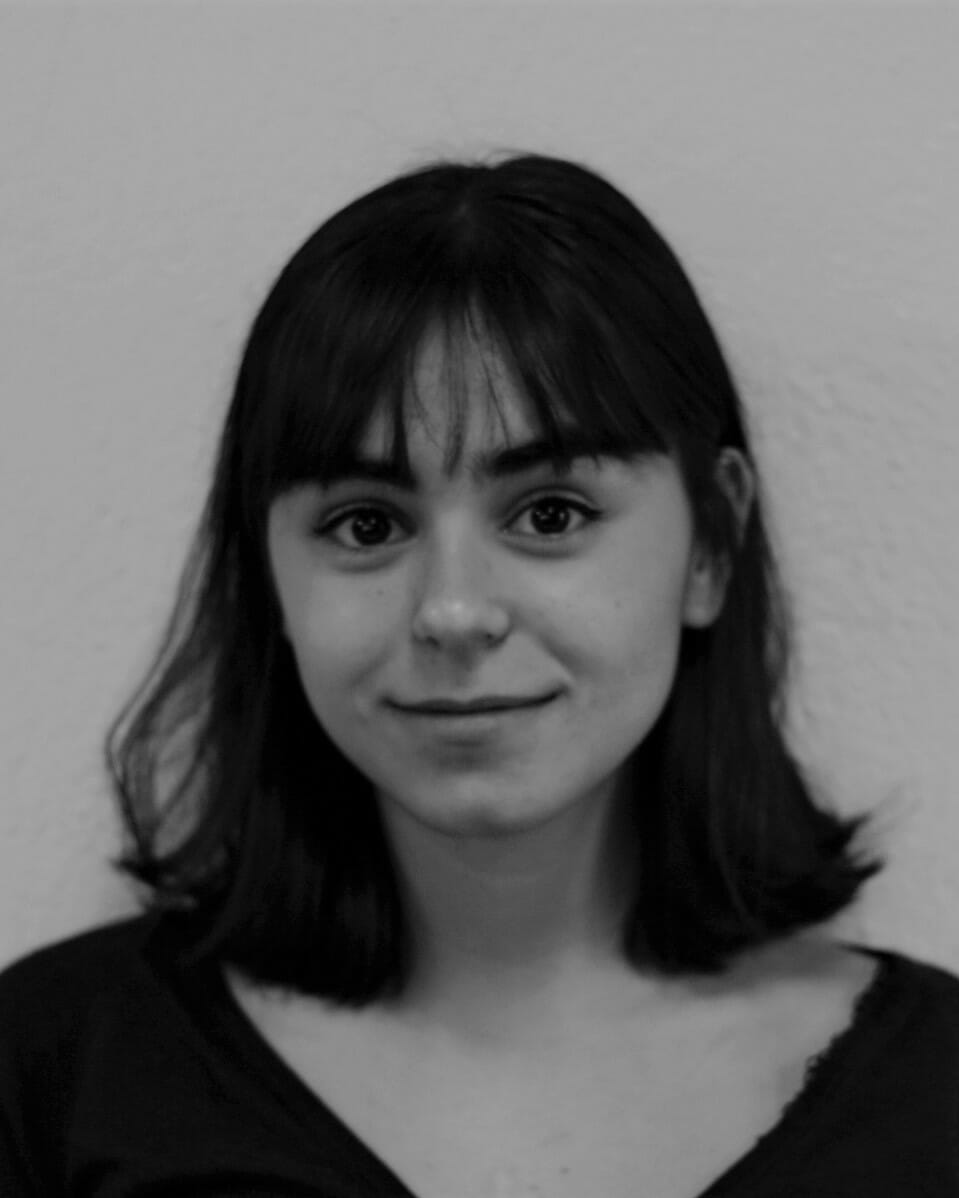
About the Author: Madalena Martins
Madalena is a young writer and actress based in Chicago. She was born and raised in Lisbon (Portugal- the home of soccer and custard tarts) then moved to Mostar (Bosnia and Herzegovina), and finally made it to the United States! Her international background resulted in a deep love for languages, cultures, travelling, and food. She is also a lover of theatre, cinema, music, and literature. In her free time, she enjoys writing, going to the beach, doing improv comedy and sketches with friends, talking to strangers, and suffocating her dog with love.
Besides this, she is interested in climate activism, feminism, and queer studies, and is interested in the intersections between these fields.

